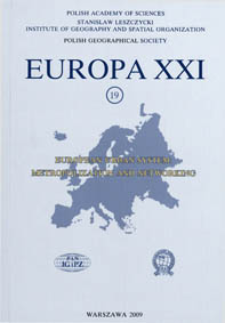
Object
Title: Cooperation and networking in metropolitan areas from community of problems to community of common interests in the Warsaw Metropolitan Area
Subtitle:
Publisher:
Place of publishing:
Description:
Type of object:
Abstract:
Since 1990, Polish municipalities have exercised planning power in terms of deciding on the ways of their economic and spatial development. Results of dynamic and sometimes uncontrolled, spontaneous development processes cross the borders of municipalities bringing problems, that can not be addressed, and solved by one municipality. Polish legislation provides legal basis for cooperation of municipalities: they may establish common goals’ unions and associations in order to deal with problems that are important for more than one municipality. However, experience of the last several years proves that cooperation among municipalities is not an easy task. It creates problems especially within functional urban areas, including metropolitan ones. In this paper, the issue of cooperation among municipalities from the Warsaw Metropolitan Area (WMA) is addressed using the perspective of networking and formulation of common development policy.
References:
1. Brown, M.P. (1992), The possibility of local autonomy, Urban Geography, 13, 257–279.
http://dx.doi.org/10.2747/0272-3638.13.3.257 -
2. Grochowski, M. (2008), Analysis of regional spatial planning and decision making strategies and their impact on land use in the urban fringe; Case study: Warsaw Metropolitan Area, Poland; Report: VI FP UE: Peri-Urban Land Use Relationships – Strategies And Sustainability Assessment Tools For Urban-Rural Linkages, Integrated Project, Warsaw.
3. Grochowski, M. (2009), Samorząd terytorialny a rozwój zrównoważony obszarów metropolitalnych (Self-government and sustainable development of metropolitan areas), Mazowsze, Studia Regionalne, 2, Mazowieckie Biuro Planowania Regionalnego, Warszawa.
4. Grochowski, M., Fuhrmann, M., Pieniążek, M., Wilk, W. Zegar, T. (2005), Warszawa – Obszar Metropolitalny Warszawy – Mazowsze; Relacje międzygminne: współpraca czy obojętność; (Warsaw – the Warsaw Metropolitan Area – Mazovian region: Inter-municipal relations: cooperation or neutrality), Samorząd Terytorialny, 7–8, Wyd. Kik, Oddział Wydawnictw Profesjonalnych Sp. z o.o., Warszawa.
5. Herschell, T. and Newman, P. (2002), Governance of Europe's city regions: Planning, policy, and politics, Routledge, London.
http://dx.doi.org/10.4324/9780203446683 -
6. Hulst, R. and van Montfort, A. (eds.) (2007), Inter-municipal cooperation in Europe, Springer, Dordrecht.
http://dx.doi.org/10.1007/1-4020-5379-7 -
7. Lackowska, M. (2009), Zarządzanie obszarami metropolitalnymi w Polsce (Management of metropolitan areas in Poland), Wyd. UW, Warszawa.
8. Lefevre, C. (1998), Metropolitan government and governance in western countries: A critical review, International Journal of Urban and Regional Research, 22 (1), 9–25.
http://dx.doi.org/10.1111/1468-2427.00120 -
9. Lisowski A. (2005), Urban sprawl process, in: Gutry-Korycka M. (ed.) Urban sprawl – Warsaw Agglomeration Case Study, Wyd. UW, Warszawa.
10. Nunes, S.C. and Barlow, M. (2002), Developments in the government of seven European metropolitan areas, GeoJournal, 58 (special issue), 1–72.
11. Statut Stowarzyszenia Metropolia Warszawa 2006, (and changed in 2009), Warszawa.
12. Strzelecki, Z. (2009), Mazowiecki wymiar polityki rozwoju, in: Rzeźnik G. (ed.) Polityka regionalna na Mazowszu, Polski Instytut Demokracji Lokalnej, FRDL, Warszawa, 15–35.
Relation:
Volume:
Start page:
End page:
Detailed Resource Type:
Format:
Rozmiar pliku 0,9 MB ; application/pdf
Resource Identifier:
oai:rcin.org.pl:55818 ; 1429-7132 ; 10.7163/Eu21.2008.19.3
Source:
CBGiOŚ. IGiPZ PAN, sygn.: Cz.6406, Cz.6407 ; click here to follow the link
Language:
Rights:
Prawa zastrzeżone - dostęp nieograniczony
Terms of use:
Digitizing institution:
Instytut Geografii i Przestrzennego Zagospodarowania Polskiej Akademii Nauk
Original in:
Projects co-financed by:
Unia Europejska. Europejski Fundusz Rozwoju Regionalnego ; Program Operacyjny Innowacyjna Gospodarka, lata 2010-2014, Priorytet 2. Infrastruktura strefy B + R
Access:
Object collections:
- Institute of Geography and Spatial Organization PAS (IGiPZ PAN) > Publications of IGiPZ PAN and employees
- Institute of Geography and Spatial Organization PAS (IGiPZ PAN) > Library > Series/Journals/Periodics
Last modified:
Mar 25, 2021
In our library since:
Aug 14, 2015
Number of object content downloads / hits:
1161
All available object's versions:
https://rcin.org.pl/igipz/publication/75503
Show description in RDF format:
Show description in RDFa format:
Show description in OAI-PMH format:
Objects Similar
Czyż, Teresa
Masik, Grzegorz
Somlyódyné Pfeil, Edit
Marszał, Tadeusz
Czyż, Teresa
Wójcik, Marcin

 INSTYTUT ARCHEOLOGII I ETNOLOGII POLSKIEJ AKADEMII NAUK
INSTYTUT ARCHEOLOGII I ETNOLOGII POLSKIEJ AKADEMII NAUK
 INSTYTUT BADAŃ LITERACKICH POLSKIEJ AKADEMII NAUK
INSTYTUT BADAŃ LITERACKICH POLSKIEJ AKADEMII NAUK
 INSTYTUT BADAWCZY LEŚNICTWA
INSTYTUT BADAWCZY LEŚNICTWA
 INSTYTUT BIOLOGII DOŚWIADCZALNEJ IM. MARCELEGO NENCKIEGO POLSKIEJ AKADEMII NAUK
INSTYTUT BIOLOGII DOŚWIADCZALNEJ IM. MARCELEGO NENCKIEGO POLSKIEJ AKADEMII NAUK
 INSTYTUT BIOLOGII SSAKÓW POLSKIEJ AKADEMII NAUK
INSTYTUT BIOLOGII SSAKÓW POLSKIEJ AKADEMII NAUK
 INSTYTUT CHEMII FIZYCZNEJ PAN
INSTYTUT CHEMII FIZYCZNEJ PAN
 INSTYTUT CHEMII ORGANICZNEJ PAN
INSTYTUT CHEMII ORGANICZNEJ PAN
 INSTYTUT FILOZOFII I SOCJOLOGII PAN
INSTYTUT FILOZOFII I SOCJOLOGII PAN
 INSTYTUT GEOGRAFII I PRZESTRZENNEGO ZAGOSPODAROWANIA PAN
INSTYTUT GEOGRAFII I PRZESTRZENNEGO ZAGOSPODAROWANIA PAN
 INSTYTUT HISTORII im. TADEUSZA MANTEUFFLA POLSKIEJ AKADEMII NAUK
INSTYTUT HISTORII im. TADEUSZA MANTEUFFLA POLSKIEJ AKADEMII NAUK
 INSTYTUT JĘZYKA POLSKIEGO POLSKIEJ AKADEMII NAUK
INSTYTUT JĘZYKA POLSKIEGO POLSKIEJ AKADEMII NAUK
 INSTYTUT MATEMATYCZNY PAN
INSTYTUT MATEMATYCZNY PAN
 INSTYTUT MEDYCYNY DOŚWIADCZALNEJ I KLINICZNEJ IM.MIROSŁAWA MOSSAKOWSKIEGO POLSKIEJ AKADEMII NAUK
INSTYTUT MEDYCYNY DOŚWIADCZALNEJ I KLINICZNEJ IM.MIROSŁAWA MOSSAKOWSKIEGO POLSKIEJ AKADEMII NAUK
 INSTYTUT PODSTAWOWYCH PROBLEMÓW TECHNIKI PAN
INSTYTUT PODSTAWOWYCH PROBLEMÓW TECHNIKI PAN
 INSTYTUT SLAWISTYKI PAN
INSTYTUT SLAWISTYKI PAN
 SIEĆ BADAWCZA ŁUKASIEWICZ - INSTYTUT TECHNOLOGII MATERIAŁÓW ELEKTRONICZNYCH
SIEĆ BADAWCZA ŁUKASIEWICZ - INSTYTUT TECHNOLOGII MATERIAŁÓW ELEKTRONICZNYCH
 MUZEUM I INSTYTUT ZOOLOGII POLSKIEJ AKADEMII NAUK
MUZEUM I INSTYTUT ZOOLOGII POLSKIEJ AKADEMII NAUK
 INSTYTUT BADAŃ SYSTEMOWYCH PAN
INSTYTUT BADAŃ SYSTEMOWYCH PAN
 INSTYTUT BOTANIKI IM. WŁADYSŁAWA SZAFERA POLSKIEJ AKADEMII NAUK
INSTYTUT BOTANIKI IM. WŁADYSŁAWA SZAFERA POLSKIEJ AKADEMII NAUK
































